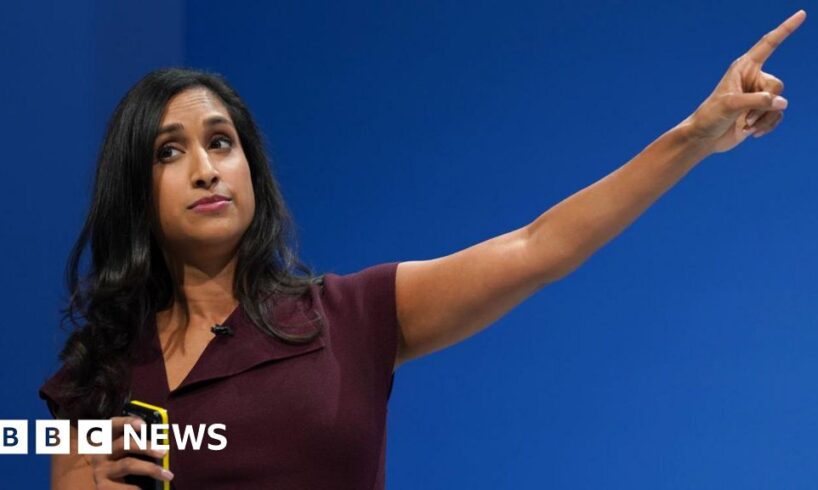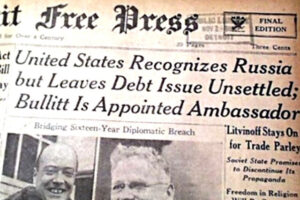
Paul SeddonPolitical reporter, Conservative Party Conference, Manchester
Getty Images
Shadow energy secretary Claire Coutinho unveiled the plans during a conference speech on Monday
The Conservatives are promising to roll back green energy rules to cut energy costs, amid an emerging election battleground over the cost of household bills.
The party has announced it would scrap carbon pricing and “rip-off wind subsidies”, claiming they add 20% to electricity prices.
It is the latest move from the party under leader Kemi Badenoch to turn the page on the net zero agenda that the party previously advocated in office.
It comes after she opened the party’s annual conference with a pledge to scrap the UK’s landmark climate laws previously championed by predecessor Theresa May.
Now the Tories have revealed further details of their plans to ditch green energy rules, as they join an increasingly crowded field of promises between the political parties over how to keep family bills down.
The party is promising that if elected, it would abolish the post-Brexit carbon pricing system put in place by Boris Johnson as a key part of his net zero plans.
It also says it would cut renewable energy subsidies by ending a regime of 20-year green energy certificates, originally introduced by Labour Energy Secretary Ed Miliband, which is currently due to continue until 2037.
The Tories are promising that scrapping the two schemes would knock a combined £165 off the average household energy bill.
By contrast, Labour is promising that its plan to decarbonise British electricity will cut domestic bills by £300 a year.
Reform UK, meanwhile, has argued scrapping “net zero madness” could save families £1,000 a year.
Credibility pitch
As with the broader pitch on the economy, the Conservatives are hoping that voters will see its promises as more credible than those of Reform, which has leapfrogged it in the polls since its drubbing at last year’s election.
During a speech to outline the policy at the conference in Manchester, shadow energy secretary Claire Coutinho treated delegates to a series of slides on the effect of wind-farm pricing auctions.
Wielding a remote control that brought up a succession of graphs, she sought to persuade activists – and the voters at home – that “anyone with half a brain can see that won’t cut bills”.
It was a point she tried to ram home during a later fringe event, where she branded Reform’s £1,000 pledge “nonsense” and compared it to Jeremy Corbyn’s eye-catching promise of free broadband at the 2019 election.
Asked why voters would not simply opt for the party promising the biggest cut, she argued voters “do actually look at the credibility of plans” on the cost of energy, as they “are so worried about it”.
‘Silent majority’
Coutinho was an architect of the initial Tory pivot away from the net zero agenda as energy secretary to Rishi Sunak, who watered down some of the party’s green commitments in a bid to revive the party’s fortunes in late 2023.
At that point, the Conservatives were still committed to the goal of reaching net zero carbon emissions by 2050 – a legal change brought in by another Tory leader, Theresa May, in 2019.
Now it has ditched the goal entirely, with Coutinho explaining to delegates that under Badenoch the party considers all “top-down targets” as an enemy of its overriding focus today to provide British homes and firms with cheaper power.
She told the fringe that in power, the Tories had got into the habit of “taking policies” from green energy lobby groups, without considering whether the “silent majority” out in the country would agree.
She also said that she had encountered “massive pushback” from officials in the energy department when she sought to stop fines for boiler manufacturers who do not hit heat pump sales targets, dubbed a “boiler tax” by critics.
The 2008 Climate Act they have now pledged to ditch, she added, had also created an “inequality in government” because strategies designed to reduce bills were not subject to the legally-binding nature enjoyed by climate law.
Striking a remorseful tone, she told members she wished the party had scrapped the legislation when it was still in power.
“I think it’s important that we recognise what we’ve got wrong, and we have to be very honest and clear about that,” she added.





